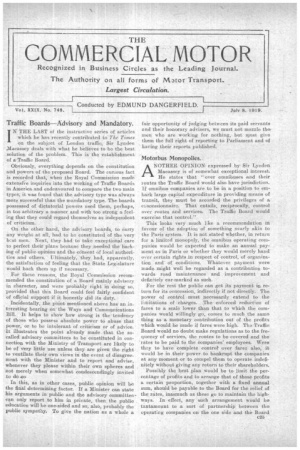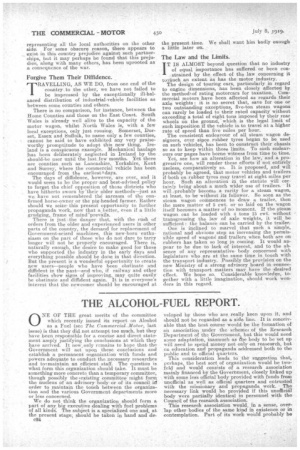Traffic Boards—Advisory and Mandatory.
Page 1

Page 2

If you've noticed an error in this article please click here to report it so we can fix it.
N THE LAST of the instructive series of articles which he has recently contributed to The Times on the subject of London traffic., Sir Lynden Macassey deals with what he believes to be the best solution of the problem._ This is the establishment of a Traffic Board.
Obviously, everything depends on the constitution and powers of the proposed Board. The curious fact is recorded that, when the Royal Commission made extensive inquiries into the working of Traffic Boards in America and endeavoured to compare the two main types, it was found that the advisory type was always more successful than the mandatory type. The boards possessed of dictatorial powers used them, perhaps, in too arbitrary a manner and with too strong a feeling that they could regard themselves as independent of criticism.
On the other hand, the advisory boards, to carry any weight at all, had to be constituted of the very b:st men. Next, they had to take exceptional care to perfect their plans because they needed the backing of public opinion and the consent of local authorities and others. Ultimately, they had, apparently, the satisfaction of feeling that the State Legislature would back them up if necessary.
For these reasons, the Royal Commission recommended the constitution of a Board mainly advisory in character, and were probably right in doing so, provided that this Board could feel fairly confident of official support if it honestly did its duty.
Incidentally, the point mentioned above has an interesting bearing on the Ways and Communications Bill. It helps to show how strong is the tendency of those who possess absolute power to abuse that power, or to be intolerant of criticism or of advice. it illustrates the point already made that the socalled advisory committees to be constituted in connection with the Ministry of Transport are likely to be of very little use unless they are given the right to ventilate their own views in the event of disagreement with the Minister and to report and advise, whenever they please within their own spheres and not merely when somewhat condescendingly invited to do-so In this, as in other cases, public opinion will be the final determining factor. If a Minister can state his arguments in public and the advisory committee'. can only report to him in private, then the public education will be one-sided and so, also, probably the public sympathy. To give the nation as a whole a fair opportunity of judging between its paid servants and their honorary advisers, we must not muzzle the. men who are working for nothing, but must give them the full right of reporting to Parliament and of having their reports published.
Motorbus Monopolies.
NOTHER OPINION expressed by Sir Lynden Macassey is of somewhat exceptional interest. He states that " over omnibuses and their routes the Traffic Board would also have jurisdiction. If omnibus companies are to be in a position to embark large capital expenditure in providing means of transit, they must be accorded the privileges of a ecalpessionnaim. That entails, reciprocally, Control over routes and services.. The Traffic Board would exercise that control," This looks very much like a recommendation in favour of the adoption of something nearly akin to the Paris system. It is not stated whether, in return for a limited monopoly, the omnibus operating companies would be expected to make an annual payment. as in Paris or whether they would merely hand over certain rights in respect of control, of organization and Of conditions. Whatever payment were made might well be regarded as a contribution towards road maintenance and improvement and definitely ear-marked as such.
For the rest the public can get its payment in return for its concession, indirectly if not directly. The power of control must necessarily extend to the Emitations of charges. The enforced reduction of fares to a scale lower than that to which the cornpanics would willingly go, comes to much. the same thing as a monetary contribution out of the prats which would be nrade if fares were high. The Traffic Board would no doubt make regulations as to the frequency of services, the routes to be covered and the 'rates to be paid to the companies' employees. Were they to have complete :control over fares also, it would be in their power to bankrupt the companies at any moment or to compel them to operate indefinitely without giving any return to their shareholders.
Possibly the best plan would be to limit the perce.ntage of profits and to arrange that of those profits a certain proportion, together with a fixed annual sum, should be payable to the Board for the relief of the rates, inasmuch as these go to maintain the highways. In effect, any such arrangement Would be tantamount to a sort of partnership between the operating companies on the one side and the Board representing all the local authorities on the other side. For some obscure reason, there appears to exist in this country prejudice against such partnerships, but it may perhaps be found that this prejudice, along with many others, has been uprooted as a, consequence of the war.
Forgive Them Their Diffidence.
TRAVELLING, AS WE DO, from one end of the country to the other, we have not failed to be impressed by the exceptionally ill-balanced distribution of industrial-vehicle facilities as between some counties and others.
There is no comparison, for instance, between the Home Counties and those on the East Coast. South Wales is already well alive to the capacity of the motor wagon, whilst North Wales is, with a few local exceptions, only just rousing. Somerset, Dorset, Essex and Suffolk, to name only a few counties, cannot be said to have exhibited any very praiseworthy promptitude to adopt this new thing. Ireland is a conspicuous example. Mechanical haulage has been deliberately neglected in Ireland by the should-be user until the last few months. Yet there are counties such as Lancashire, Yorkshire' Kent and Surrey, where the commercial vehicle has been encouraged from the earliestr4days.
The days of diffidence, however, are over, and it would seem to be the proper and best-advised policy to forget the chief opposition of those districts who have hitherto sworn by 'their older methods—just as we have not remembered the sarcasm of the eonfirmed horse-owner or the pig-headed farmer. Rather should we seize-this present opportunity to further propaganda work, now that a better, even if a little grudging, frame of mind'prevails. There is just the danger that, with the rush of orders froin the older and experienced users in other parts of the country, the demand for replacement of Government-seized machines, this new-born enthusiasm on the part of those who do not dare to tarry longer will not be properly encouraged. There is, naturally enough, the desire to make good for those who supported the industry in the early days and everything possible should be done in that direction. But the present is a wonderful opportunity to create new users—people who have been obstinate and diffident in the past—and who, if railway and other facilities show signs of improving, may quite easily be obstinate and diffident again. It is in everyone's interest that the newcomer should be encouraged at the present time. We shall want him badly enough a little later an.
The Law and the Limits.
IT IS ALMOST beyond question that no industry of equal importance has suffered or been constrained by the effect of the law concerning it toefeuch an extent as has the motor industry. The design of touring cars, particularly in regard to engine dimensions, has been closely affected by the methodeof rating motorcars for taxation. Commercial motors have been affected as regards their axle weights : it is no secret that, save for one or two outstanding exceptions, five-ton steam wagons can rarely be loaded to their rated capacity without exceeding a total of eight tons imposed by their rear wheels on the ground, which is the legal limit of such imposition if the vehicle is to travel at a higher rate of speed than five miles per hour.
The consistent endeavour of all steam wagon designers, ever since rubber tyres began to be used on such vehicles, has been to construct their chassis so as to keep within those limits. To such endeavours our pages have borne witness from time to time.
Yet, see how an alteration in the law, and a progressive one, will render these efforts if not entirely useless, comparatively so. It is proposed, and will probably be agreed, that motor vehicles and trailers if both on rubber tyres may travel at eight miles per hour. Such an alteration in the statute will certainly bring about a much wider use of trailers. It will .probably become a rarity for a steam wagon, at least, to be without its follower. So soon as the steam wagon commences to draw a trailer, then the mere_matter of 5 cwt. or so laid on the wagon itself becomes a matter of no inoment. If the steam wagon can be loaded with 4 tons 15 cwt without transgressing the laew of axle weights, it will be sufficient : the balance can be carried by the trailer. One is inclined to marvel that such a simple, rational and obvious step as increasing the permissible speed of wagons and trailers when both are on rubbers has taken so long in coming. It would appear to be due to lack of interest, and to the absence of any representative body concerned with legislature who are at the same time in touch with the transport industry. Possibly the provision on the new Ministry of a strong advisory board in connection with transport matters may have the desired effect. 'We hope so. Considerable knowledge, together with a little imagination, should work wonders in this regard.






















